1
Portrait of Wilfred T. "Doc" Cruickshank1970s
CKNX Radio and Television, Wingham, Ontario
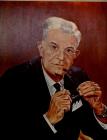 Credits:
Credits:Ross & Carol Hamilton
2
W.T. Cruickshank's Story & How He Got The Name "Doc"...-Wilford Thomas Cruickshank was born on 1897 on a farm on the 1st concession of Morris Township, 2 miles south of Wingham (The Cruickshank homestead is now the Wingham Golf Course)."If he has any heroes it is Sir Wilfred Laurier, the man his father named him after. He began reading about the Canadian prime minister and grew to admire his qualities. Doc explains that his father "wasn't an educated man" and probably didn't know or care about the spelling difference between Wilfred, Wilford and Wilfrid." (LFP5-1970, p.1) He moved to Wingham with his family in 1912 and attended Wingham Public School. When his father died in 1915, he had to quit school in Grade 8 and go to work. He was employed at a local furniture factory, then got a job chauffeuring a local doctor - hence the nickname Doc. In 1924 - he was working at the Western Foundry, 10 hours a day, sold radios between 7 and 8 o'clock, and worked as a projectionist at the local theatre from 8 to 11. His interest in radio increased, resulting in a decision to make it a full time job. He took on an agency for a well known line of radios and set up a workshop. His business expanded as broadcast and radios became more popular. (CKNX 25th Anniversary booklet, 1951 p.1-2)
-Doc participated in many sports in his youth and is an ardent sports fan (in 1951). He'd been a member of the Wingham Town Council, the Arena Commission, Lions Club, Western Ontario Athletic Association, and Chamber of Commerce in 1951. He made regular appearances on the microphone at CKNX. He was married to Mabel, who contributed to the development of CKNX through her "understanding and words of encouragement". (CKNX 25th Anniversary booklet, 1951, p. 3)
-Origins of the nickname "Doc" - There are a few explanations ...
1) He acquired the name Doc while he was employed as a chauffeur for a local surgeon. Mrs. Cruickshank is the former Mabel Chessel of Mitchell, Ontario. The nickname has been carried through the family to the point where Mrs. Cruickshank is known to many townspeople as Mrs. Doc. (LFP-1, 1971) He owned a Model T Ford and acquired the job of driving the local doctor around in the car as he made his house-to-house calls. This got him the nickname Doc. (Who-2,2005)
2)one explanation for the nickname "Doc" goes back to his repair shop days when he carried his tools and equipment in a black doctor's hand bag. (LFP-1, 1971)
-"Actually he exploited the nickname when he started his radio shop shortly after, by putting signs in the door: "The doctor will be back at ..." or "The doctor is out." (LFP5-1970, p.1)
3
This the Stone School, S.S 7 Morris Twp, where W.T. Cruickshank attended public school.1877
Stone School, Morris Township, Ontario
 Credits:
Credits:Wingham Library, Wingham, Ontario
4
Wingham Public School, that W.T. Cruickshank (and later his son) attended when he moved to Wingham.Wingham, Ontario
 Credits:
Credits:Wingham Library, Wingham, Ontario
5
Doc's Days in Theatre ...Doc was fatherless at 15 and hadn't finished his fourth book in school when he was forced out to work on his own. He went to work at the local foundry for 10 hours a day. In the evenings he was projectionist at the Wingham theatre (Lyceum Theatre). Between times he drove the doctor about on his calls. That made a full day but a solid weekly wage, Doc admits. He was making $18 a week at the foundry, $15 as a projectionist and $5 or $6 as a chauffeur. He left for Goderich to be a movie projectionist there at $40 a week and then moved to Mitchell and began his own movie house there. That didn't pan out, so he returned to Wingham. He left the movie business then after ushering in the era of talkies. But after all these years his heart belongs to cinema. (LFP5-1970, p.1)
In 1962, he bought the tiny, 300 seat Lyceum Theatre in Wingham where he had started out in the electronic media so many years ago. For the first few years, Doc ran it himself and it was not unusual to find Doc in the booth taking tickets. The Lyceum operates Thursday, Friday and Saturdays only now - " a babysitting service," smiles Doc. (LFP5-1970, p.1) Cruickshank later bought the bankrupt local movie theatre and operated it at a loss because, according to CKNX-TV chief engineer Scott Reid, he felt it was a necessary part of the community. (LFP-1, 1971)The Cruickshank family continued to own the theatre until at least 1979 (100 Yrs, 175)
6
Doc worked as a projectionist at the Lyceum Theatre at nights.December 1920s
Lyceum Theatre, Josephine Street, Wingham, Ontario
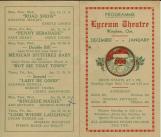 Credits:
Credits:North Huron Museum, Wingham, Ontario
7
Doc's Resume ...1897 - Wilford Thomas Cruickshank was born in Morris Township, close to Wingham, Ontario
1912/13 - The Cruickshank family moved to Wingham, Ontario and he began to attend school in Wingham
1915 - He left school, due to his father's death and began working at the local furniture factory and chauffering one of the Wingham doctors (hence the nickname Doc) Doc was fatherless at 15 and hadn't finished his fourth book in school when he was forced out to work on his own.
circa 1915-1924 - He left for Goderich to be a movie projectionist for $40 a week and then moved to Mitchell and began his own movie house there. That didn't pan out, so he returned to Wingham. But after all these years his heart belongs to cinema. (LFP5-1970, p.1)
In Wingham, he worked 10 hours a day at the Western Foundry. He also worked as a movie projectionist at the Lyceum Theatre from 8 to 11pm in the evenings. For an hour in the evening (7-8 pm) between jobs and on weekends, he repaired and sold radios from a small shop he had on main street Wingham. He went to work at the local foundry for 10 hours a day. In the evenings he was a projectionist at the Wingham theatre. Between times he drove the doctor about on his calls. That made a full day but a solid weekly wage, Doc admits. He was making $18 a week at the foundry, $15 as a projectionist and $5 or $6 as a chauffeur.
1924 - Doc was selling Stromberg Carlson radios in his down-town shop by night and on weekends. In those days (about 1924) there was only four or five radio stations in Canada and this new technology was really only beginning to catch the imagination of listeners in the U.S. Radio sales were few and far between but interest was building. Doc persevered and quit his job at the foundry and opened his store and radio shop on Wingham's main street. Sales picked up and it was then that he got the idea that perhaps he could contribute to the rather sparse choice of programming material that was being broadcast at that time. (Carbert essay, 1995)p.1-2
1925 - Doc Cruickshanks helped with the technical end of the operation of talking movies shown at the Lyceum Theatre.(100 Yrs, 175)
February 1926 - Doc Cruickshank built his first transmitter from instructions in a Popular Mechanics magazine and began experimenting with broadcasting.
February 5, 1926 - Doc broadcast the Wingham Lion's Club Luncheon program (WAT-7, 1926)
Feb 7, 1926 - Doc broadcast the Sunday program from his home - piano and singing. (WAT-7, 1926)
Feb 11, 1926 - Doc broadcast Old Tyme music (WAT-8, 1926)
Feb 11, 1926 - Cruickshank ad says "JOKE Wingham Now On the Map." Note that Cruickshank has applied for a government licence. There is also news of Wingham's noon day program. (WAT-8, 1926)
March 4, 1926 - on March 5, 1926 there was to be a Radio fans meeting in the Wingham Council Chambers. (WAT-9, 1926)
March 11, 1926 - the paper reported the establishment of a radio club to support the Wingham broadcasts. (WAT-10, 1926)
March 11, 1926 - The Wingham Radio Club executives are: J.A. Morton, honorary President, Dr. A.J. Irwin, President, T.T. Field, vice president, Dr. George Howson, secretary and W.A. Galbraith, treasurer. The executive committee is H.W. Shane, W.C. Reid and W. Cruickshank. The membership fee is $1 per person. They know of 76 radio sets in Wingham at the present time. There is notice of a March 16, 1926 meeting in the Wingham council chambers.
There is a JOKE mention in the Cruickshank ad. (WAT-10, 1926)
March 18, 1926 - There is a notice - "Radio Fans - your receiving licence expires March 31. Renew yours at Radio Shop - $1." There is no JOKE ad in the Cruickshank ad from here out. (WAT-11, 1926)
April 29, 1926 - Cruickshank now has a licensed radio station - 10 BP - on every Thursday evening at 9:00 pm. (WAT-12, 1926)
May 6, 1926 - Notice that the radio station 10 BP is on Thursday night and Tuesday night with programs. There is notice of a program on May 6 that they will be an on-air with a dance programme broadcasting the dance from the Wingham Armouries. (WAT-13, 1926)
July 8, 1926 - There is an article that the Wingham United Church service was broadcast by 10 BP on July 4, 1926. It noted that the church service will be broadcast next Sunday - July 11, 1926. There is a note that Cruickshank is interested in broadcasting other church services. (WAT-14, 1926)
1935 - Doc sells radios from his shop and operates an amateur radio station from its backrooms
1935 - Doc procurs, with help, a professional radio license for the CKNX radio station and begins to fund its operation through the sale of advertisements. He is still operating his radio shop as well.
1935 - 1941 - The radio station grows in staff and size. Doc becomes station manager.
1941 - the station became a full-time job for Doc and he operated from a room in the Brunswick Hotel, a structure no longer standing. (LFP-5, 1970)
1943 - "W.T." was down to Toronto to attend the Canadian Association of Broadcasters Convention last week and spent three or four days with the radio heads of Canada. "Doc" returned with several fresh ideas and plans for your added radio service. Many new developments are on the way for wartime broadcasting and some of the new regulations are expected to have a considerable influence on the quality of programs, the type of advertising possible and the manpower question." (CKNX Almanac-11, 1943)p.4
1947 - Doc closed the radio shop he had been running since 1925 in 1947. (LFP-5, 1970)
1954 - Doc Cruickshanks bought the Warren House. His son, Bud, later became its owner. It was a Radio Shack in 1979. (100 Yrs, 194) Doc again recently reversed procedure when he bought Warren House, a TV, stereo and electrical supply store in town "just because he wanted a shop again." (LFP-5, 1970) In 1955, leading up to the start of CKNX-TV, television sets were selling like hotcakes in Wingham. (TS-1, 1955)
1955 - Doc becomes owner of a radio station and a TV station. His son manages the TV station while his brother manages the radio station.
1960s - Doc steps back from CKNX into semi-retirement
1962 - Doc " bought the tiny, 300 seat Lyceum Theatre in Wingham where he had started out in the electronic media so many years ago. For the first few years, Doc ran it himself and it was not unusual to find Doc in the booth taking tickets. The Lyceum operates Thursday, Friday and Saturdays only now - " a babysitting service," smiles Doc. (LFP5-1970, p.1) The Cruickshank family continued to own the theatre until at least 1979 (100 Yrs, 175)
1970 - CKNX board of directors - Doc, John, Bud and Lois McCall (Bud's daughter) hold all the shares to CKNX (WAT-4, 1970)
1971 - Doc dies, the day before the sale of CKNX television and radio to the Blackburn Group of London is finalized.
8
W.T. "Doc" Cruickshank with the radio transmitter he built with a Popular Mechanics articleFebruary 1926
Cruickshank's Radio Shop, Josephine Street, Wingham, Ontario
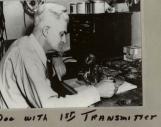 Credits:
Credits:North Huron Museum, Wingham, Ontario
9
A write-up about W.T. Cruickshank featured in the Barn Dance souvenir booklet.circa 1940s
920 CKNX, Wingham, Ontario
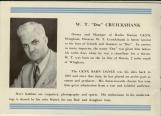 Credits:
Credits:Barn Dance Museum, Wingham, Ontario
North Huron Museum, Wingham, Ontario
10
G.W. "Bud" Cruickshank, Doc's son ...Gerald Cruickshank aka "Bud" Cruickshank- born September 26, 1924 - in 1951, Bud is the Assistant General Manager - studying every phase of the operation. He also takes his place before the microphones and reports for duty early in the morning to add his talents to The Top of the Morning Show. He was born in Wingham, served in the Canadian Army for 2 years. He married Dorothy Wade of Belgrave in 1947. They have one daughter, Mary Ann. (25th Anniversary, 1951) Bud had a sister, Lois who married Mr. Ross McCall of Morris Township. (OST-1, 1955, p. 19)
Bud Cruickshank was the son of Doc Cruickshank. He started a regular shift at the station at age 15. He has presented just about every type of show. His other hobby is photography. (I-1, 2006) In 1942, Bud Gerald was heard on Saturday Morning Frolic from 11:00 to 11:45. (CKNX Almanac- 5,1942 p.4) "Since he was a "little squirt" Bud has been a regular performer over at the station and says he remembers clearly about 10 years ago (1933)when he used to say "Hello" to his grandmother in Mitchell every Sunday over the microphone. He started a regular shift with the other announcers about four years ago (1939) and has been announcing steadily ever since. He has handled just about every type of show presented over the station and feels completely at home before a mike. At present he carried the "Saturday Morning Frolic" each week at 11:00 am and the Song Shop each evening at 6:00pm. Bud is also heard on the sportscast nightly. A great deal of the writing for the latter feature is from his typewriter of this versatile young artist.
Bud attended elementary and secondary schools in Wingham and finished up in 1942. He was just in time to devote his full attention to assisting in the station's valuable work at a period when men were next to impossible to get. From the caliber of announcing and writing that has come from this arrangement, it is indeed fortunate that school finished when it did. ... Bud is of medium height, very slim with sandy brown-blond hair and usually a very serious look on his face. An intelligent and cool lad, Bud gets along well with his fellowworkers and does well at the station. "(CKNX Almanac-11, 1943)p.5
"W.T. "Doc" Cruickshank had high hopes that his son would figure prominently in the future of his radio station. Today (1955) those hopes have become a reality and Bud holds down the responsible position of Assistant General Manager of CKNX and now Station Manager of CKNX-Television.
"Management of a television station is not a great deal different than the management of any other business," say Bud. "Perhaps the only difference would be, that in Television management it is hard to know where your management ends and the rugged infant of TV takes over."
Included in his duties will be the over-all directing of the different operations (Engineering, Commerical) and also the formulating of Station Policy.
At the beginning of this battle, with TV, Bud will likely be found too, sitting in the Control Room running the gain on perhaps the Video deck, the audio console even out in the studio directing traffic. This would seem to be a little out of the line of work to be handled by a manager, but Bud, being a chip-off-the-old-block would find it hard to stay at his desk when things are going on in the operations end of the building.
Bud was born in Wingham and served in the Canadian Army for two years. In 1947 he married Dorothy Wade of Belgrave and now has a family of three (Mary Ann, Ellen and a new son, Stephen) Dorothy when asked how she liked being married to a man in Television said, "Ours has been a very happy marriage. Bud is hardly at home long enough for us to get into too many disagreements." Seriously though, Bud does manage to spend some time with his family each day, and has made it a practice of leaving his business worries at the office, and enjoying life at home. As manager of the television outlet of CKNX, Bud hopes that it will develop and become a viewing habit in this area as CKNX Radio is doing and has done." (OST-5, 1955, p. 19)
"After a stint in the Army Bud came back as an announcer, newsman, writer ... or whatever was needed. This experience gave him a very clear vision of what Radio and Television broadcasting was all about ... along with a lot of knowledge about the equipment needed to make it work. Bud served as general manager of the company for a number of years ... and at the time of the sale to the Blackburn Group, he was company president. After his broadcasting career ended in 1971, Bud operated the Radio Shack franchise just off Wingham's main street and played a role in Wingham's business and civic community. Bud and Dorothy had four children, Mary Ann, Ellen Steven and Kathie. Bud Cruickshank died in October 2001.
11
Gerald "Bud" Cruickshank, son of W.T. Cruickshank worked in both radio and television at CKNX.1940-1980
CKNX Radio and Television, Wingham, Ontario
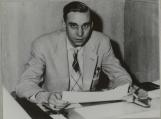 Credits:
Credits:North Huron Museum, Wingham, Ontario
12
John "Crook" Cruickshank, Doc's younger brother ...-He was born in Wingham in 1913 and spent most of his time there, except (prior to 1942)for the few times he "ventured across the border to visit friends and relatives. "More than a few readers of the Almanac will have met John Cruickshank at some time or other. Because Johnny is the sort of guy who is well liked wherever he goes, being typical of the good-natured grin that characterizes 'Crook." (CKNX Almanac-4, 1942 p. 1)
- He started at CKNX when he was 15, "made to run controls on the old 10BP station when he could be caught. At that time as now his favourite trick was to get away by himself and do some powerful fishin' in some well-stocked creek. The only difference between the present John and the old one is that now he has a few more responsibilities. With his advent into the army, John assumed even more the role of responsibility and takes it gracefully"
-John's nick name was Crook. He started at CKNX when he was about 15. He ran the controls at 10BP. He left and worked at the Gurney Glove factory until 1937 when he returned to CKNX. He played baseball and hockey. He was an announcer, News/Sports Editor and program director. (I-1, 2006)
- At 21, John took a job with Gurney's Glove Works in Wingham. He stayed there awhile making friends as he went. In 1937, CKNX again added him to their payroll and there he stayed till June 1942 when the Provost claimed his services for the duration. He is well known in the sporting circles and played with the Wingham Hockey Club and the Wingham Baseball Club for a number of years. He claims he wasn't a star but admits holding down the bench as well as any player in Western Ontario. His other interests are divided between the fishing, golfing, hiking, hunting and motoring. In the winter, he finds skating an excellent outlet. (CKNX Almanac-4, 1942 p.4
John was the announcer of Sunday shows as well as the Entertainment Guide during Farm and Home hour and the odd turn on the CKNX Sports Reporter broadcast. His position on the staff will be hard to fully replace because John was not only announcer but News-Sports Editor and Program Director. CKNX Almanac-4, 1942 p.4
-John began shortly after CKNX opened as a part time control operator. He became a full time staff member in 1937 and since then has gained experience in every department. He was appointed station manager in 1947. He was born in Wingham in 1912 and always lived in Wingham. He served 4 years in the Canadian Army. His hobbies are hockey, baseball and has begun fishing and golf. He married Margaret Miller of Wingham in 1943. His daughter, Joan Patricia was born in the spring of 1950. He takes his place before the microphone each week day at 12:35 pm for Noon Markets. (25th Anniversary, 1951)
-In 1951, John was the Radio Station manager of programs. When TV was added in 1955, John became the manager of the radio station, while his nephew Bud became the manager of the television station.
- 1970 - CKNX board of directors - Doc, John, Bud and Lois McCall (Bud's daughter) hold all the shares to CKNX (WAT-4, 1970) The sale of CKNX to the Blackburn family saw John retire from the CKNX board of directors and from CKNX radio.
-John died in 2000.
13
John Cruickshank, brother of W.T. Cruickshank became manager of the radio station in 1955.1955
920 CKNX, Wingham, Ontario
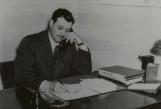 Credits:
Credits:North Huron Museum, Wingham, Ontario
14
Awards & Recognition ...1940s - This is the station that in the early 1940s had already been presented with the prestigious "Beaver Award" for broadcasting excellence and community service. This award, presented by the industry newspaper, "Canadian Broadcaster," chose CKNX radio above all 82 privately owned and operated stations in Canada and 11 government owned and operated stations from coast to coast. (Carbert essay, 1995) p.18
1957 - "The criss-crossed, red and white painted TV tower of station CKNX, Wingham (pop 2,800), soars 650 feet over the rich and rolling farmlands of Western Ontario that run inland from Lake Huron. Known to viewers as "Channel 8", the station beams in on an estimated 12,000 mainly rural homes, Wingham's is the only privately-owned rural television station in North America, the only small town TV station in Canada. A live and hustling enterprise, the station won last year's Showmanship Award given by Liberty magazine, edging out all of Canada's 35 other privately-owned stations. (O-1, 1958) p.15
November 16, 1962 - W.T. "Doc" Cruickshank was made an honorary life member of the Central Canada Broadcasters' Association.
1967 - W.T. "Doc" Cruickshank is awarded the Centennial Medal for his contribution in large measure to the progress of his community and the nation.
1967-68 - W.T. "Doc" Cruickshank was recognized for his contribution to public services from the Ontario Manpower Centres.
1986 - W.T. "Doc" Cruickshank was inducted posthumously into the Broadcast Hall of Fame, located in Ottawa. A copy of the plaque will be on display at CKNX Broadcasting Limited in Wingham. Induction ceremonies took place during the annual meeting of the Canadian Association of Broadcasters in Vancouver in October 1986. (WAT-5,1986)
1987 - W.T. Cruickshank inducted into the Ontario Agricultural Hall of Fame in Milton, Ontario, along with James G. Cockshutt, Fredrick W. Cohoe, William Charles Good and J. Elgin Armstrong. He was nominated by CKNX Broadcasting Ltd - Andy McTavish, R.G. Bennett, William Turnbull and George Gear. His nomination reads, " Farm people in Western Ontario acknowledge a deep debt of gratitude for the efforts of W.T. Cruickshank on their behalf. His radio station, CKNX, first established in 1926, was always known as the "Ontario Farm Station". In 1939, the first of a trial series of Farm Radio Forum programs was aired on CKNX, paving the way for the National Farm Radio Forum programs on CBC. When a television licence was granted in 1955, CKNX again established a new mark on the broadcasting industry. Graduates of the CKNX Farm Broadcast Department have gone on to serve in key positions in Ontario Agriculture. (PR-1, 1987)
Local Honours -
He was made an Honorary Kinsmen member.
He was presented with a bible from the Wingham Ministerial Association.
He was given the Award of Merit from the Wingham Branch 180 of the Royal Canadian Legion for services, help and cooperation in the furtherance of the Canadian Legion. It was the first time this award was given to a radio or TV station in the history of the Ontario command.